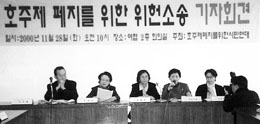The North branch of the Seoul District Court (presided by Yang Seung Tae) decided on March 29 to take the case of Ms. Bae and four others to the Constitutional Court. The five women had applied to the Gu office to remove the title of hoju - formerly held by their ex-husbands - from their respective family registers and to re-register their children under the mothers' family registers. When their applications were denied, they took the case to District Court, asking it to order the Gu offices to stop refusing their applications. This brings the number of successfully lodged petitions to two out of four. The small but meaningful victory is expected to accelerate the movement to abolish the hoju system.

Judge Yang Seung Tae of the North branch of the Seoul District Court said, "Although the final ruling will be made by the Constitutional Court, it can be said for now that the plaintiffs have set forth a considerably persuasive argument. The issue of abolishing the hoju system deserves the public attention, and the time has come to put it on the social agenda."
In response to the judge's decision, the Citizens for the Abolition of the Hoju System, the Korea Legal Aid Center for Family Relations, the KWAU, and KNCW groups that have been leading the effort to gather cases of people victimized by the hoju system and to collect plaintiffs to sue the system unanimously released statements declaring their support. The groups also called on the Constitutional Court to uphold the spirit of the Constitution, which defines gender equality as a national ideology, by ruling that the hoju system is unconstitutional.

